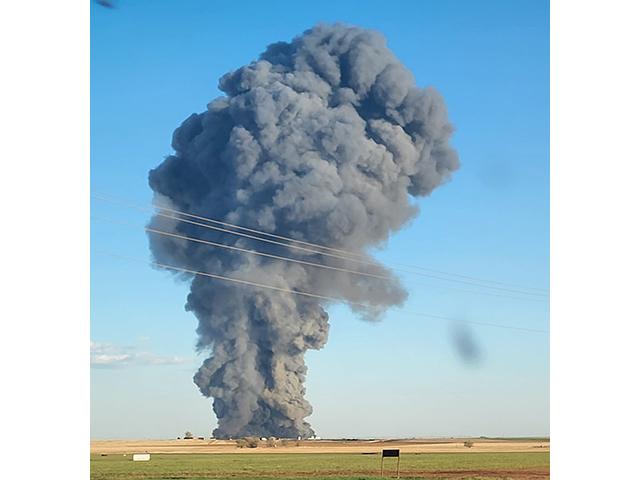Texas Dairy Fire Not Terrorism
Texas Dairy Fire That Killed 18,000 Cows Ruled Accidental, Not Terrorism
Concerns over terrorist attacks on America's food supply pick up any time there is a large-scale loss of production livestock. The most recent dairy fire and explosion at South Fork Dairy Farm in Dimmitt, Texas, that killed 18,000 cows is the latest such incident. But that massive dairy fire, and explosion, has now officially been labeled an "accident" by the Texas State Fire Marshal's office.
According to a news release from the Fire Marshal, investigators were on the scene of the Castro County dairy fire for two days, April 10 and 11. They conducted "an origin and cause investigation to determine where the fire first originated and a cause for the fire."
An origin and cause type investigation determines which category type a fire falls under: accidental, incendiary, natural causes or undetermined.
EQUIPMENT FAILURE HAPPENED BEFORE
According to the Fire Marshal's office, the investigation included interviews of parties involved and an examination of the scene. The belief today is that the fire started at the northern end of the South Fork Dairy Farm operation, pen No. 3, and was the result of equipment failure.
The report said that two other pieces of equipment, identical to the one that caught fire at South Fork, had burned previously. One such incident was at this same dairy, and the other at another unnamed dairy in the state. More investigations by engineers specializing in equipment failures will follow.
"There was no evidence found that would indicate foul play," stressed the report. "This fire was classified by the investigating officers as being accidental."
The presence of liquid fuel, hydraulic oil, and other flammable and combustible materials allowed the fire to grow so fast that the operator could not control it with fire extinguishers. An explosion resulted due to the rapid expansion of the flammable liquids, a phenomenon known as "smoke explosion."
P[L1] D[0x0] M[300x250] OOP[F] ADUNIT[] T[]
"Smoke explosions occur when smoke which is unburnt fuel, heats to the point of ignition and rapidly ignites," explained the report.
The Texas State Fire Marshal's Office stressed the following: "I want to reassure everyone that this was not the result of any type of terroristic attack, or any type of event caused to interrupt the milk supply. This was a tragic accident ..."
MASSIVE CLEANUP UNDERWAY
The cleanup continues at the site of the fire and explosion, with on-site disposal being monitored by the Texas Commission on Environmental Quality (TCEQ) out of Amarillo.
Media relations specialist at the TCEQ, Victoria Cann, told DTN there are established procedures in the state for disposal of livestock carcasses. Some of those rules, summarized in a document numbered RG-419, include the fact that the owner, or operator of the property, farm or facility, is responsible for disposal in a timely and sanitary manner. This cannot be done in a way that discharges into or is adjacent to water, that creates or maintains a nuisance condition, or that endangers public health and welfare. The rules governing these requirements are found in the Texas Administrative Code, Title 30.
Non-diseased animal carcasses usually must be collected within 24 hours of death and properly disposed of. An emergency situation, with a large number of animals lost, however, is handled on a case-by-case basis. Disposal options include the following: on-site burial, composting, or sending the carcass to a municipal solid-waste landfill, renderer, or commercial waste incinerator.
NOTHING LIKE THIS HAS HAPPENED BEFORE
Reb Wayne, director of communications for the Texas Department of Agriculture, spoke with DTN about the Dimmitt dairy farm explosion. He said that to the best of his knowledge, nothing of this magnitude has ever happened in the state.
Wayne described the South Fork facility as relatively new, and large, with the barn itself being a half-mile long.
"That is a very large facility, and whatever happened there happened so fast that from what we're hearing, there was no reaction time. There just has never been any sort of loss of this magnitude even registered here in our state. When we initially heard about this, losses were estimated at 10,000 animals. That was hard to comprehend. Then, suddenly, it was 18,000 animals. This is a tough situation all around. It is a miracle there was no loss of human life."
Sid Miller, Texas agriculture commissioner, called the incident a "freak accident" in an interview with a local news station. He described the dairy facility as state-of-the-art, climate controlled, and less than 3 years old.
"It just rolled through the whole barn in less than 5 minutes," Miller said of the fire. The commissioner added that it was his understanding the TCEQ has given permission to bury the animals.
Miller said he hopes the industry can learn from this tragedy.
"This never happened before," he stressed. "We'll get to the bottom of it and be prepared to eliminate the possibility of it ever happening again."
See other DTN coverage on the fire and explosion here: https://www.dtnpf.com/….
Victoria Myers can be reached at vicki.myers@dtn.com
Follow her on Twitter @myersPF
(c) Copyright 2023 DTN, LLC. All rights reserved.






